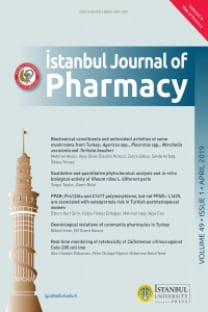ALLELIC VARIANTS AT ALCOHOL METABOLISING GENES IN TURKISH POPULATION
ADH, ALDH, Turkish population, Genotype frequency
ALLELIC VARIANTS AT ALCOHOL METABOLISING GENES IN TURKISH POPULATION
ADH, ALDH, Turkish population, Genotype frequency,
___
- 1. Ehlers CL, Gilder DA, Harris L, Carr L. (2001). Alcohol Clin Exp Res 5;1773-1777.
- 2. Bosron WF, Li TK. (1986). Hepatology 6; 502-510.
- 3. Matsuo K, Hamajima N, Shinoda M, Hatooka S, Inoue M, Takezaki T, Tajima K. (2001). Carcinogenesis 22;913-916.
- 4. Daly AK, Steen VM, Fairbrother KS, Idle JR. (1996). Methods Enzymol 272;199-210.
- 5. Neumark YD, Friedlander Y, Durst R, Leitersdorf E, Jaffe D, Ramchandani VA, O’Connor S, Carr LG, Li TK. (2004). Alcohol Clin Exp Res 28;10-14.
- 6. Seitz HK, Stickel F. (2007). Nat Rev Cancer 7;599-612.
- 7. Baan R, Straif K, Grosse Y, Secretan B, El Ghissassi F, Bouvard V, Altieri A, Cogliano V. (2007). Lancet Oncol 8;292-293.
- 8. Terry MB, Gammon MD, Zhang FF, Knight JA, Wang Q, Britton JA, Teitelbaum SL, Neugut AI, Santella RM. (2006). Carcinogenesis 27;840- 847.
- 9. Brennan P, Lewis S, Hashibe M, Bell DA, Boffetta P, Bouchardy C, Caporaso N, Chen C, Coutelle C, Diehl SR, Hayes RB, Olshan AF, Schwartz SM, Sturgis EM, Wei Q, Zavras AI, Benhamou S. (2004). Am J Epidemiol 159;1-16.
- 10. Cichoz-Lach H, Partycka J, Nesina I, Celinski K, Slomka M, Wojcierowski J. (2005). Scan J Gastroenterol 42; 493-498.
- 11. Osier M, Pakstis AJ, Kidd JR, Lee JF, Yin SJ, Ko HC, Edenberg HJ, Lu RB, Kidd KK. (1999). Am J Hum Genet 64;1147-1157.
- 12. Barras E, Coutelle C, Rosell A, Fernandez-Muixi F, Broch M, Crosas B, Hjelmqvist L, Lorenzo A, Gutierrez C, Santos M, Szczepanek M, Heilig M, Quattrocchi P, Farres J, Vidal F, Richart C, Mach T, Bogdal J, Jornvall H, Seitz HK, Couzigou P, Pares X. (2000). Hepatology 31;984-989. B. ALPERTUNGA, E. S. YILDIZ, G. ÖZHAN 121
- 13. Chen CC, Lu RB, Chen YC, Wang MF, Chang, YC, Li TK, Yin SJ. (1999). Am J Hum Genet 65;795-807.
- 14. Shen YC, Fan JH, Edenberg HJ, Li TK, Cui YH, Wang, YF, Tian CH, Zhou CF, Zhou RL, Wang J, Zhao ZL, Xia GY. (1997). Alcohol Clin Exp Res 21;1272-1277.
- 15. Thomasson HR, Crabb DW, Edenberg HJ, Li TK, Hwu, HG, Chen CC, Yeh EK, Yin SJ. (1994). Alcohol Clin Exp Res 18;640-643.
- 16. Whitfield JB, Nightingale BN, Bucholz KK, Madden PA, Heath AC, Martin NG. (1998). Alcohol Clin Exp Res 22;1463-1469.
- 17. Wall TL, Carr LG, Ehlers CL. (2003). Am J Psychiatry 160;41-46.
- 18. Pares X, Farres J, Pares A, Soler X, Panes J, Ferre JL, Caballería J, Rodés J. (1994). Alcohol Alcohol 29;701-705.
- 19. Chen WJ, Loh EW, Hsu YP, Chen CC, Yu JM, Cheng AT. (1996). Br J Psychiatry 168;762-767.
- 20. Crabb DW, Edenberg HJ, Bosron WF, Li TK. (1989). J Clin Invest 83;314-16.
- 21. Higuchi S, Matsushita S, Muramatsu T, Murayama M, Hayashida M. (1996). Alcohol Clin Exp Res 20;493-497.
- 22. Wall TL, Shea SH, Chan KK, Carr LG. (2001). J Abnorm Psychol 110;173-178.
- 23. Kortunay S, Yasar U, Tulin I, Bozkurt A, Babaoglu MO. (2006). Methods Find Exp Clin Pharmacol 28 (4);229-235.
- 24. Kayaalti Z, Soylemezoglu T. (2010). Alcohol 44 (5);415-423.
- 25. Goedde HW, Agarwal DP, Fritze G, Meier-Tackmann D, Singh S, Beckmann G, Bhatia K, Chen LZ, Fang B, Lisker R, Paik YK, Rothhammer F, Saha N, Segal B, Srivastava LM, Czeizel A. (1992). Hum Genet 88;344-346.
- 26. Garcia-Martin E, Martinez C, Serrador M, Navarro H, Navacerrada F, Agundez JA, Jiménez-Jiménez FJ. (2010). Headache 50;85-91.
- 27. Tiemersma EW, Wark PA, Ocke MC, Bunschoten A, Otten MH, Kok FJ, Kampman E. (2003). Cancer Epidemiol Biomarkers Prev 12;419-425.
- 28. Cichoz-Lach H, Krzysztof C, Slomka M. (2007). HPB 10;138-143.
- 29. Yang SJ, Wang HY, Li XQ, Du HZ, Zheng CJ, Chen HG, Mu XY, Yang 122 Allelic Variants at Alcohol Metabolising Genes in Turkish Population CX. (2007). World J Gastroenterol 13(43);5760-5764.
- 30. Tseng YM, Hu BW, Tsai SM, Chen IJ, Jin YR, Lee JH, Huang FD, Wu SH, Yeh FL, Tsai LY. (2007). Clin Biochem 40;370-376.
- 31. Hasegawa Y, Higuchi S, Matsushita S, Miyaoka H. (2002). J Neural Transm 109;513-521.
- 32. Konishi T, Calvillo M, Leng AS, Feng J, Lee T, Lee H, Smith JL, Sial SH, Berman N, French S, Eysselein V, Lin KM, Wan YJ. (2003). Exp Mol Pathol 74;183-189.
- 33. Loza AJM, Iglesias MTR, Diaz IP, Castellanos SC, Andrade CG, Mora MEM, Diaz CR, Kershenobich D, Reyes GG. (2006). Alcohol 39;73-79.
- 34. Mulligan CJ, Robin RW, Osier MV, Sambuughin N, Goldfarb LG, Kittles RA, Hesselbrock D, Goldman D, Long JC. (2003). Hum Genet 113;325-336.
- 35. Gordillo-Bastidas E, Panduro A, Gordillo-Bastidas D, Zepeda-Carrillo EA, Garcia-Banuelos JJ, Munoz-Valle JF, Bastidas-Ramírez BE. (2010). Alcohol Clin Exp Res 34;142-149.
- 36. Poupon R, Nalpas B, Coutelle C, Fleury B, Couzigou P, Higueret D. (1992). Hepatology 15;1017-1022.
- 37. Quertemont E. (2004). Mol. Psychiatry 9;570-581.
- ISSN: 2548-0731
- Yayın Aralığı: Yılda 3 Sayı
- Başlangıç: 1965
- Yayıncı: İstanbul Üniversitesi
BIOLOGICAL ACTIVITIES AND PHENOLIC-FLAVONOID CONTENTS OF BILBERRY EXTRACTS
İ. HACIBEKİROĞLU, U. KOLAK*, İ. Hacibekiroğlu, U. Kolak* I. HACIBEKİROĞLU, U. KOLAK*
ALLELIC VARIANTS AT ALCOHOL METABOLISING GENES IN TURKISH POPULATION
B. ALPERTUNGA, E. S. YILDIZ, G. ÖZHAN, B. Alpertunga*, E. S. Yildiz, G. Özhan B. ALPERTUNGA*, E. S. YILDIZ, G. ÖZHAN
S. OZDEN, S. BOLKENT, S. GEZGINCI-OKTAYOGLU, P. ARDA-PIRINCCI, A. KARATUG, B. ALPERTUNGA, S. Ozden1, *, S. Bolkent2, S. Gezginci-ok S. OZDEN1, *, S. BOLKENT2, S. GEZGINCI-OKTAYOGLU2, P. ARDA-PIRINCCI2, A. KARATUG2, B. ALPER
A. H. MERİÇLİ, F. E. KARAGÖZ, H. ÖZÇELİK, A. H. Meriçli1, *, F. E. Karagöz1, H. A. H. MERİÇLİ1, *, F. E. KARAGÖZ1, H. ÖZÇELİK2
SPECTROPHOTOMETRIC DETERMINATION OF MIRTAZAPINE IN PURE AND TABLET PHARMACEUTICAL PREPARATION
E. KEL ÖZDEMİR, S. TATAR ULU, D. ÖZER ÜNAL, E. Kel Özdemir, S. Tatar Ulu*, D. Öze E. KEL ÖZDEMİR, S. TATAR ULU*, D. ÖZER ÜNAL
